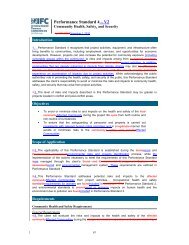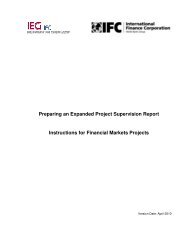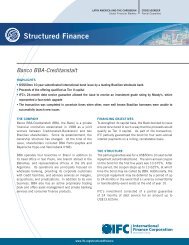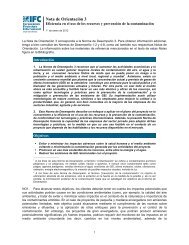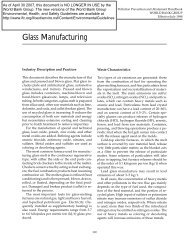Corporate Governance for Banks in Southeast Europe: Policy - IFC
Corporate Governance for Banks in Southeast Europe: Policy - IFC
Corporate Governance for Banks in Southeast Europe: Policy - IFC
You also want an ePaper? Increase the reach of your titles
YUMPU automatically turns print PDFs into web optimized ePapers that Google loves.
Tests <strong>for</strong> <strong>in</strong>tegrity are needed. However, probity tests have<br />
their limitations, pr<strong>in</strong>cipally because they work through a<br />
process of exclusion based on a series of negative criteria.<br />
They do not establish what is needed or test <strong>for</strong> other<br />
important behavioral characteristics of board members.<br />
Behavioral characteristics <strong>in</strong>clude, <strong>for</strong> example, capacity<br />
<strong>for</strong> leadership, ability to work on a team, and ability to<br />
receive and provide constructive criticism.<br />
Behavioral Issues and Group Dynamics<br />
“You f<strong>in</strong>d that <strong>for</strong>eigners talk too much and<br />
the locals do not talk. That creates tension.<br />
It does not just have a neutral effect; it is bad<br />
dynamics on the board.”<br />
Dragica Pilipovic Chaffey, Serbia<br />
In SEE, few banks have a clear notion of what skills are required on the board or have a <strong>for</strong>mal job description<br />
<strong>for</strong> the needed board member. Nor do they publish such job descriptions or disclose why board members<br />
have been selected <strong>for</strong> their posts.<br />
Independence<br />
Best-practice boards have the capacity to make objective and unbiased economic decisions. Objective and<br />
unbiased judgment is also necessary to protect the bank and its shareholders from the possible negative<br />
effects of conflicts of <strong>in</strong>terest. The way boards typically achieve these goals is by hav<strong>in</strong>g <strong>in</strong>dependent board<br />
members. Typically, there are three classifications of board members: 1) executive, 2) nonexecutive, and 3)<br />
<strong>in</strong>dependent. 23 A sufficient number of nonexecutive and <strong>in</strong>dependent board members is the way to achieve<br />
considered and objective decision mak<strong>in</strong>g.<br />
Independence and the capacity <strong>for</strong> <strong>in</strong>dependent judgment are particularly important on the audit,<br />
remuneration, and nom<strong>in</strong>ations committees of the board, because these three committees are tasked with<br />
oversee<strong>in</strong>g issues where the potential <strong>for</strong> a conflict of <strong>in</strong>terest is particularly acute. Best practice usually<br />
suggests that audit and remuneration committees be staffed fully by <strong>in</strong>dependent board members, and<br />
nom<strong>in</strong>ations committees be staffed <strong>in</strong> majority by <strong>in</strong>dependent board members. (A further discussion of<br />
board committees is found <strong>in</strong> Section III.A.6, below.)<br />
Chart 2: Independence of Boards <strong>in</strong> SEE <strong>Banks</strong><br />
What percentage of your board is <strong>in</strong>dependent accord<strong>in</strong>g to applicable legislation, bank<strong>in</strong>g<br />
regulation, and/or governance codes?<br />
no <strong>in</strong>dependent directors<br />
less than 30%<br />
30% to 50%<br />
more than 50%<br />
0 5 10 15 20 25 30 35 40<br />
Source: Data from EBRD, <strong>Corporate</strong> <strong>Governance</strong> Assessment of <strong>Banks</strong> (2010–2011). Question asked to regulators <strong>in</strong> the region.<br />
23 Def<strong>in</strong>itions of <strong>in</strong>dependence vary <strong>in</strong> SEE legislation (see Background Box 1, below). Accord<strong>in</strong>g to <strong>in</strong>ternational best practice,<br />
nonexecutive board members may or may not be <strong>in</strong>dependent. Executives are never considered <strong>in</strong>dependent.<br />
<strong>Corporate</strong> <strong>Governance</strong> <strong>for</strong> <strong>Banks</strong> <strong>in</strong> <strong>Southeast</strong> <strong>Europe</strong> <strong>Policy</strong> Brief 17



